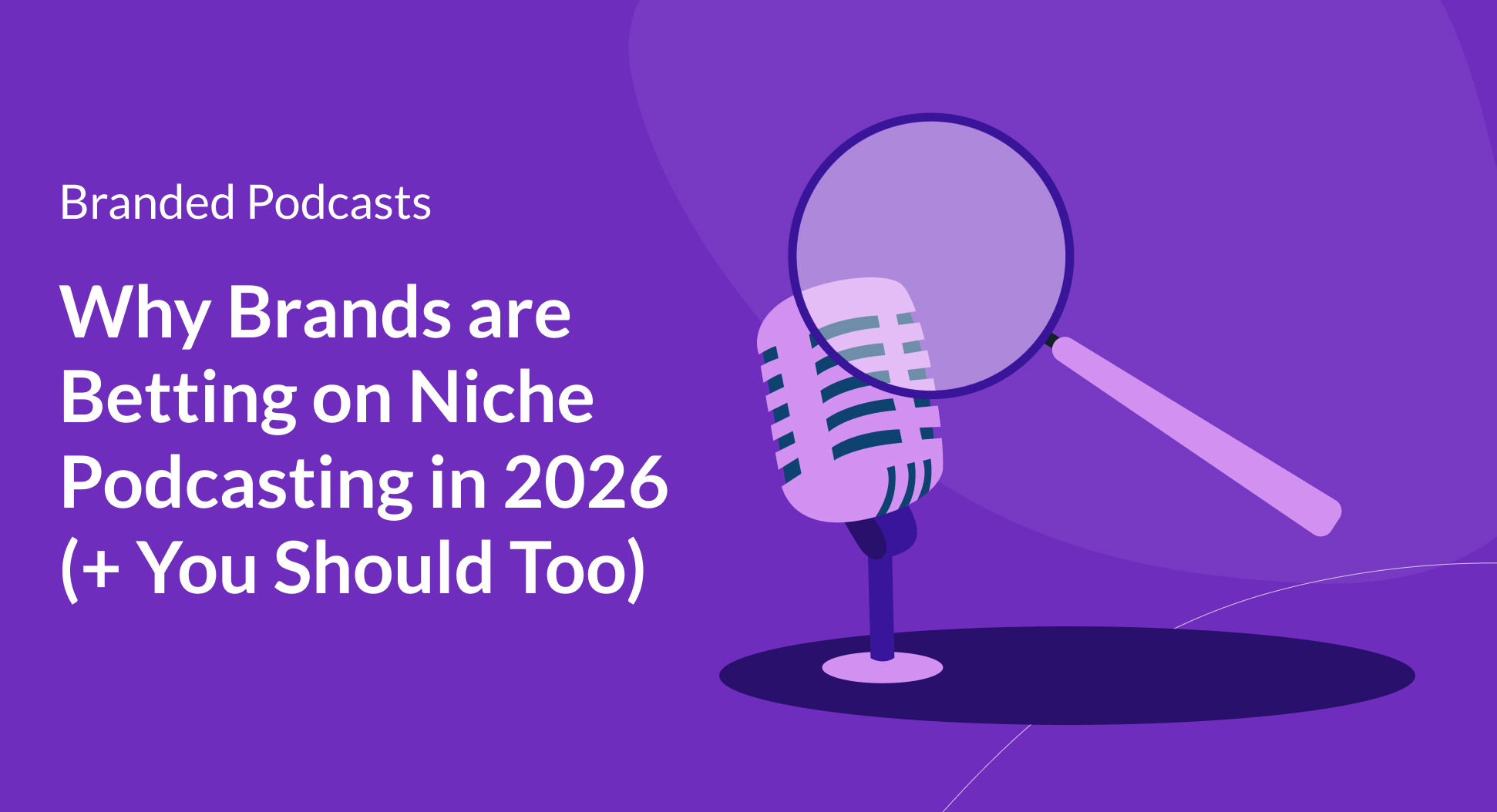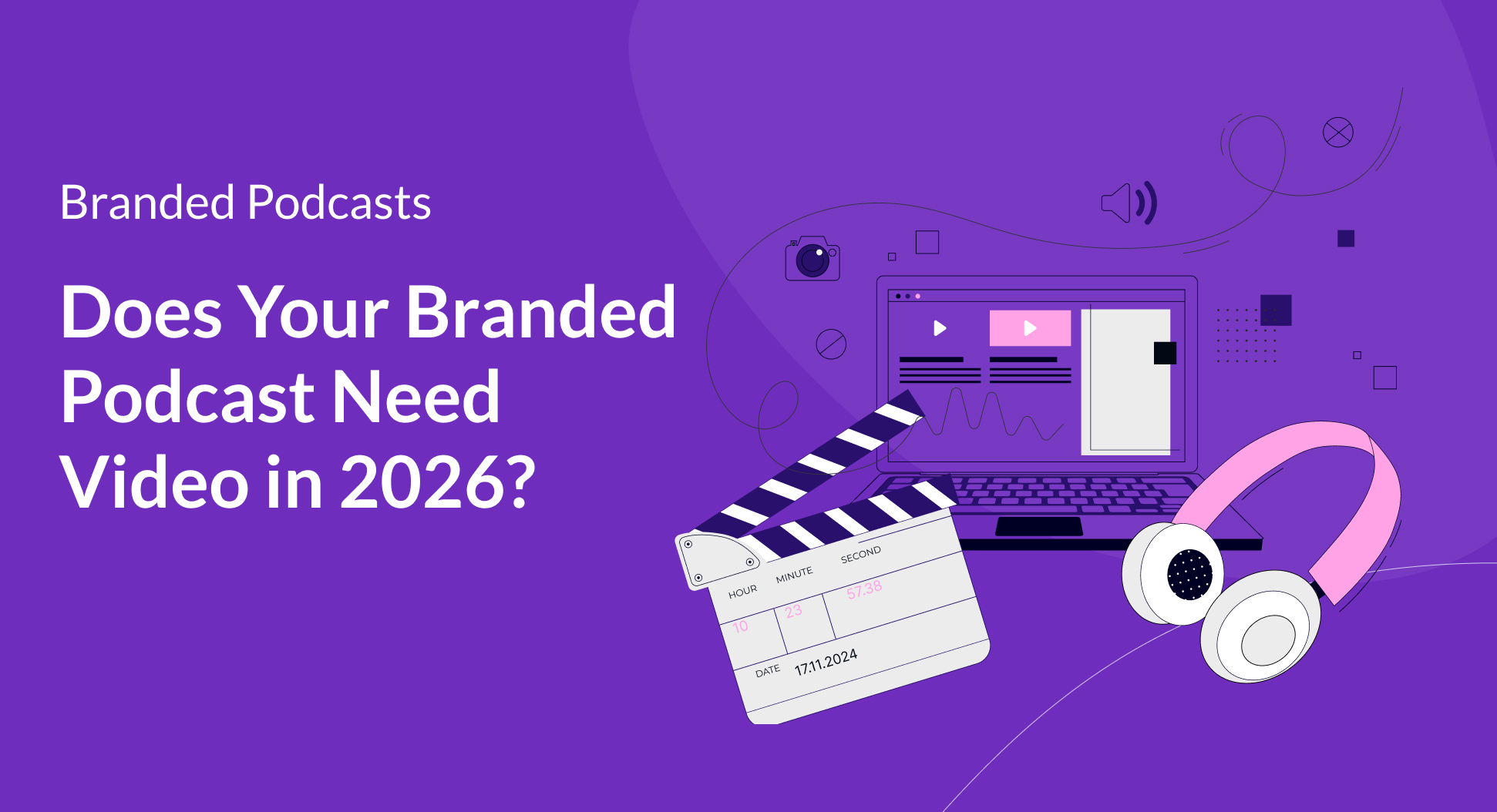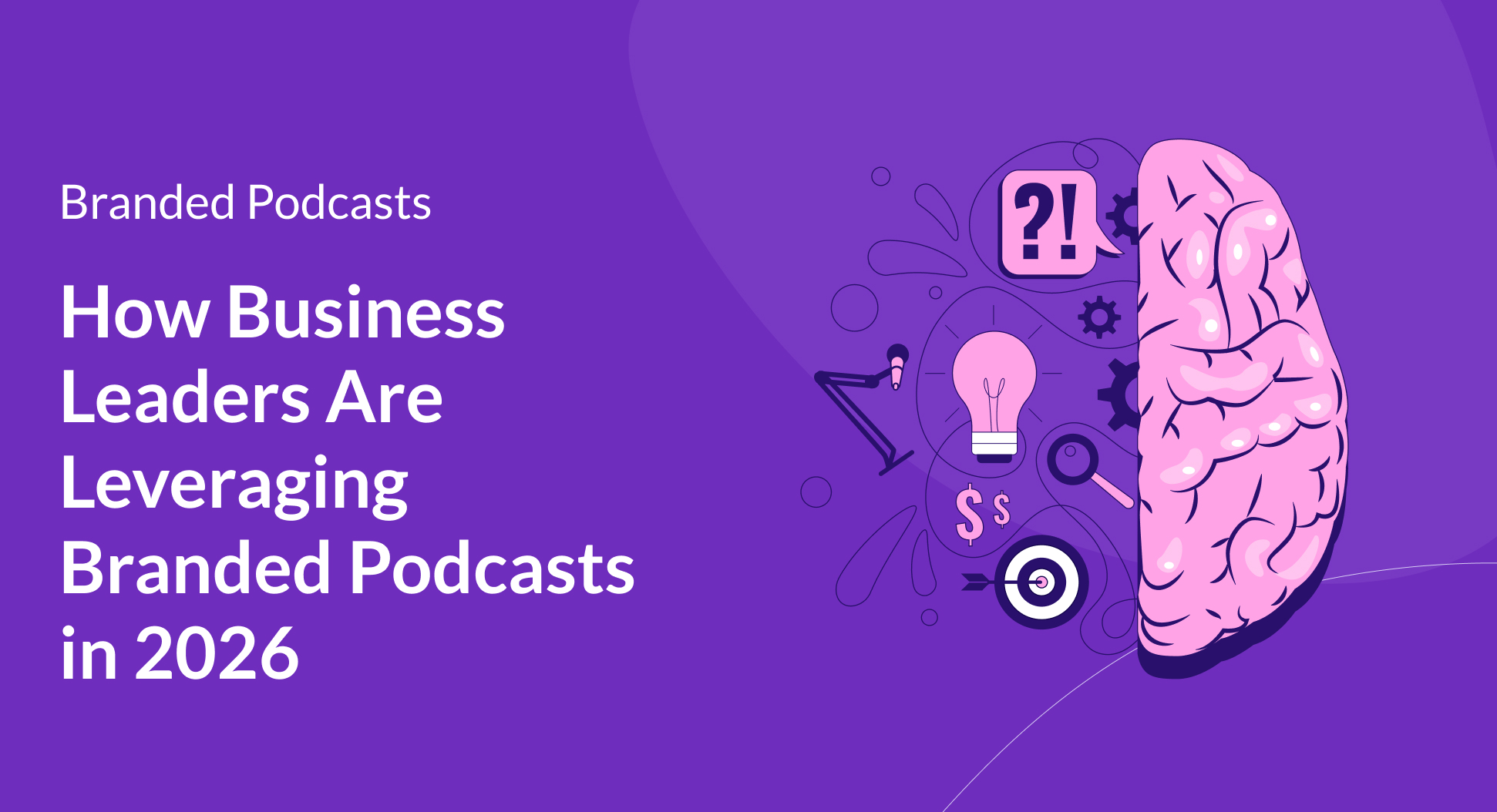Contents
What if a branded podcast could make listeners love your company more just by tuning in? It’s not magic – it’s the halo effect in action.
According to a recent Signal Hill Insights study, 61% of branded podcast listeners said that after listening to an episode, it made them feel more favorable toward the brand. That’s a jaw-dropping stat for any marketer.
It means the right corporate podcast can do more than entertain – it can elevate brand perception.
In this post, we’ll break down exactly what the halo effect is (and why marketers should care), explore how it applies to corporate podcasts, and highlight four examples of companies knocking it out of the park with their own shows.
So let’s dive in.
TL;DR
- Branded podcasts create real brand lift — 61% of listeners report feeling more favorable toward the brand after listening.
- The halo effect is earned by delivering audience-first content that informs, entertains, or inspires, not by pushing products or services.
- The best corporate podcasts prioritize storytelling, authenticity, and production quality to hold attention and build trust.
- Brands like Emergent BioSolutions, Expedia Group, Impact.com, and SickKids Foundation are leveraging podcasts to humanize their mission and reinforce values.
- Marketers should invest in audience research, high-quality production, cross-channel distribution, and measuring beyond downloads to make the most of the halo effect.
What is the “halo effect” in marketing?
Before we jump into corporate podcasts, let’s unpack the halo effect concept.
In marketing psychology, the halo effect is a cognitive bias where our overall impression of something is influenced by one outstanding trait or experience. In plain English: if a consumer has a positive experience with one aspect of a brand, that positive vibe “halo” extends to how they feel about the brand as a whole.
The term comes from the idea of an angel’s halo – a glowing ring of goodwill, shining over everything associated with that experience.
For example, say you buy a gadget from Company X and it works like a dream. Thanks to the halo effect, you might start assuming everything else Company X makes is awesome too (even if you haven’t tried other products yet).
Your one great experience casts a halo of trust and favorability over the entire brand. This phenomenon is gold for marketers: it means a single positive touchpoint can boost brand loyalty, retention, and word-of-mouth across the board.
So, how does this relate to podcasts? Well, I’m glad you asked:
Branded podcasts and the halo effect
Now, let’s take the halo effect concept and apply it to branded podcasts.
But first, we need to dissect what a branded podcast is:
A branded podcast, or corporate podcast and company podcast, is essentially a show created or sponsored by a company. It’s not an infomercial – it’s a piece of content marketing, often storytelling or thought-leadership driven, that just happens to have a brand behind it.
When done right, listeners might not even feel like they’re being marketed to. They’re just enjoying a really good show that also, over time, makes them like the sponsoring brand more.
That’s the halo effect in action.
Remember the stat we shared above? That 61% of listeners felt more favorable toward the brand after listening to a branded podcast? The Signal Hill Insight’s team explicitly calls this the “halo effect,” because the brand is essentially “basking in the glow” of providing content the listener loved.
The podcast delivers value or entertainment, and the credit rubs off on the brand’s image.
Think about it: podcasts are an opt-in, deeply engaging medium. Nobody is forcing you to hit play on a company’s podcast — you choose to listen, probably because the topic interests you.
And if the show holds your attention (which 75% of listeners said it does), you come away feeling entertained, informed, or inspired.
Branded podcasts that elevate brand perception
Now, let’s explore some real-life branded podcasts that have created the halo effect for themselves:

1. Countermeasures by Emergent BioSolutions
Emergent BioSolutions, a life sciences company, launched Countermeasures to raise awareness about the opioid overdose crisis.
This podcast is anything but a corporate promotion – it’s a powerful narrative series that tells real-life stories from the front lines of the opioid epidemic. We hear from first responders, doctors, community advocates, and people personally impacted by opioid addiction.
The tone is empathetic and educational, focusing on hope, solutions, and reducing stigma.
By centering the podcast on a critical public health issue (rather than on Emergent’s products), Emergent demonstrates its commitment to its core mission of public health and social responsibility.

2. Powering Travel by Expedia Group
Expedia Group’s Powering Travel podcast is a B2B gem that also appeals to travel fanatics. The show welcomes hospitality and travel leaders to share how they’re innovating and navigating the future of travel.
Launched in 2020 during the pandemic as a way to stay connected with partners, Powering Travel has since grown into a vital resource in the travel industry, with listeners in 140+ countries.
The corporate podcast isn’t a prolonged ad for Expedia’s services. It’s focused on value for the listener – making sense of travel tech changes, sharing success stories, and candidly discussing challenges.
Brandon Ehrhardt, Senior Director of Partner Programs at Expedia Group, shares, “Powering Travel isn’t just about discussing the travel industry – it’s about making a difference and spotlighting those advancing travel for everyone.”

3. The Partnership Economy by Impact.com
Impact.com, a leading partnership management software company, created The Partnership Economy podcast to champion the power of partnerships in business.
The show is aimed at fellow businesses, marketers, and agencies interested in affiliate marketing, influencer partnerships, and the broader partnership economy.
The halo effect for Impact.com comes from thought leadership and education. By providing a platform where experts share advice and success stories, Impact.com positions itself as the authority in the partnerships space.
This addresses a real pain point: as noted in their Shorty Award entry, many people don’t fully understand partnership marketing yet. The podcast fills that gap, effectively saying, “We’re here to help you learn and succeed in this new frontier.”

4. SickKids VS by SickKids Foundation
The SickKids Foundation (the fundraising arm of Toronto’s Hospital for Sick Children) took a novel approach to connect with donors and the public: a podcast called SickKids VS. If you think hospital fundraising content can’t be riveting, think again.
SickKids VS takes listeners to the front lines of the fight for children’s health. Each episode dives into a breakthrough medical discovery or a high-stakes health challenge, told through the experiences of researchers, doctors, patients, and families. From “wonder drugs” for mutant tumors to machines that keep a child’s heart beating outside the body, these stories mix science with human emotion.
For the SickKids Foundation, the halo effect is about deepening trust and emotional connection. Hospitals and charities know that trust is everything – donors need to feel confident that an organization is making a difference. This podcast helps accomplish that by showcasing the incredible innovation and dedication happening behind the scenes at SickKids.
How the halo effect in corporate podcasts works
What do the four podcasts mentioned above have in common, despite being in very different industries (pharma, travel, automotive, healthcare)?
Each one exemplifies factors that any brand marketer can emulate to harness the halo effect in their own company’s podcast:
- Audience-first content: They all put the listener’s interests ahead of the brand’s immediate promotional agenda. As Steve Pratt, founder of Pacific Content, puts it, a branded podcast must be from you but not about you. That means picking topics that resonate with your target audience.
- Storytelling & authenticity > selling: The best branded podcasts feel like shows, not ads. All our examples use brand storytelling, expert interviews, or educational discussions to provide real value. They avoid corporate cheerleading and instead build a narrative that naturally relates to the brand’s domain.
- Quality & consistency: They’re professionally produced, with attention to narrative flow and audio quality. They also release episodes consistently, which helps maintain audience interest over time. It’s hard to build a loyal following (and hence a halo effect) with one-and-done content.
- Engaging formats: The examples use various tactics to stay engaging: brand storytelling, charismatic hosts or guests, real-world examples, and even touches of humor. Marketers should design their podcast format intentionally, you don’t need to fall into the common Q&A interview structure.
- Alignment with brand values: The show aligns with the brand’s identity and values. Emergent cares about public health and safety – hence a show about solving a health crisis. Expedia believes in the power of travel – hence a show about advancing travel for all. Choose a theme that merges your brand’s expertise and the audience’s interest.
- Credible voices: Notice that not all these podcasts rely solely on internal voices. Powering Travel features outside experts; The Partnership Economy brings on leaders from other companies. Guests, or even an external host, can boost credibility.
- Emotional connection: Stories can create emotional bonds. Emotions encode memory, and if your podcast can make someone feel something – laughter, inspiration, hope – that feeling will likely become associated with your brand.
How marketers can harness the halo effect in their podcast strategy
You can talk the talk, but can you walk the walk? Let’s break down how marketers can craft corporate podcasts that uplift brand perception.
1. Do your homework on your podcast audience
It all starts with knowing who you’re talking to and what they care about. Because, if you don’t know who you’re creating content for and what they want from you… it’ll be hard to generate brand impact.
Are you targeting time-strapped CIOs, adventure-seeking travelers, or small business founders? The more specific you get, the better you can tailor content to hook their interest.
Conduct audience research and leverage what we like to call an ideal listener persona (similar to an ideal customer persona - ICP). Explore listener areas like:
- Demographics: Age, gender, location, income
- Psychographics: Habits, hobbies, social media usage
- Firmographics: Companies they work at, job role, job title
- Pain points: What challenges do they currently face that you can help solve?
2. Choose a theme that serves the audience & showcases expertise
It’s not just about identifying who your audience will be, you need to create content that’s hyper-relevant to them. Otherwise… why would they give your corporate podcast the time of day?
Pick a clear theme or niche where you can deliver unique value to your desired audience. Ideally, of course, it’s an area where your brand has credibility, but make sure it’s framed around audience benefit.
For example, instead of going broad with topics covering “the marketing industry”, instead, get more specific with topics like: “B2B marketing for medium-sized brands” or “B2C marketing mishaps (and how to avoid them)”. This way, you can make it clear who the podcast is for while subtly weaving in your brand’s strengths without making the show about you.
3. Invest in quality podcast production & storytelling
The halo effect only works if people enjoy listening to your podcast. Meaning, they choose you over not just other podcasts, but other mediums.
Poor audio quality, rambling interviews, or overly scripted corporate-speak can turn listeners off fast (and that could actually create a reverse halo – yikes!).
If you have the budget, hire a full-service podcast agency to support the development, production, distribution, and growth of your show. Not only do agencies come with a wealth of knowledge and experience in the production and growth of branded podcasts, but you can also find ones that likely specialize in your brand’s industry, size, or content focus.
Every agency is built differently, so explore our list of the best podcast agencies.
4. Leverage your podcast content across channels
Your podcast shouldn’t live in a silo. If it is, you’re ignoring the repurposing power of a branded podcast.
Save you and other teams' time by making the podcast a cross-functional piece of content, using it across mediums like:
- Social media: Turn clips from the episode into shareable videos, carousels, reels, audiograms, quotes, etc.
- Email marketing: Share new episodes as they drop in newsletters, highlighting key takeaways to drive listeners or provide recaps for those who have already listened.
- Content writing: Dive deeper into episode topics or recap the conversation with blogs, listicles, or downloadable content.
- Sales: Podcasts aren’t just a marketing tool; use your branded podcast as a way to nurture leads and partnerships.
- PR: Leverage the podcast as a source of newsworthy content. Maybe it’s a new season launching, a special guest, an award won, etc.
The above tactics don’t just drive more listeners to the podcast but also amplify the thought leadership halo by placing your show in front of a wider audience.
5. Measure podcast analytics (beyond downloads)
We’ve said it once before, and we’ll say it again: downloads are a vanity metric, similar to website traffic.
It doesn’t answer key questions like:
- Who’s listening?
- Why are they listening?
- Are they enjoying listening?
- Where are they coming from?
- What’s the ROI of the podcast?
You’ll want to report on podcast analytics like:
- Consumption rates
- Drop-off points
- Audience demographics
- Listener firmographics (B2B Analytics)
- Unique listeners
- Cost per listener attention
- Ratings & reviews
But trust us, we know gathering this information isn’t always easy or clear. We’ve been there, we’ve felt it when measuring the impact of our own clients’ shows.
That’s why we created CoHost, a podcast analytics and audience insights platform built specifically for brands. Loved by brands like Walmart, NASA, L’Oreal, HP, and Expedia Group, we recommend checking it out. Reach out to our team if you have any questions!
6. Stay true to your brand’s voice, but don’t be afraid to have fun
A conversational tone works wonders in podcasts.
Even if your brand is in a “serious” industry, the podcast itself can be approachable and even a bit cheeky if appropriate. Listeners appreciate authenticity – sounding human and relatable.
All our example podcasts maintain a tone that fits their subject but isn’t stuffy. As a marketer, find the sweet spot where your podcast’s tone aligns with brand values but still feels like a friendly discussion.
This might mean media training your internal spokespeople to loosen up a little on the mic or choosing a host known for their engaging personality. When your brand comes across as genuine and likable on a podcast, that halo shines even brighter because listeners feel like they know you.
The halo effect: Leveraging corporate podcasts for brand perception
In the era of ad-fatigue and information overload, branded podcasts offer a refreshing way to build meaningful connections with your audience.
The halo effect is the secret sauce that turns those connections into tangible brand impact, transforming listeners into fans and fans into advocates. As we’ve seen, whether you’re a B2B tech platform, a travel giant, a healthcare innovator, or a nonprofit foundation, a great podcast can elevate how people perceive your brand.
For brand marketers, if you want that halo, you have to earn it with content that puts your audience first, showcases your brand’s humanity and expertise, and stays consistently excellent.
Not done reading about branded podcasts? Get the latest case studies, stats, and industry news directly in your inbox every other week with The Branded Podcaster. Subscribe today!






.png)

.png)




.png)
.png)
.png)
.png)